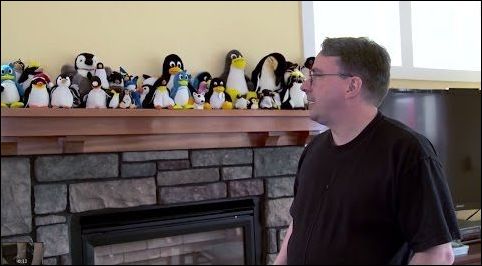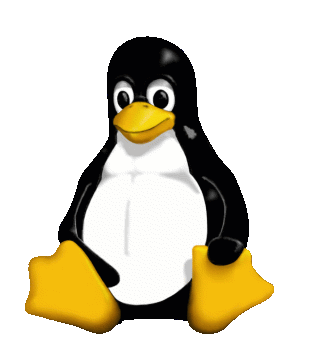| Previous
Page |
PCLinuxOS
Magazine |
PCLinuxOS |
Article List |
Disclaimer |
Next Page |
Linux 25th Birthday Trivia & Fun Facts |
|
by Paul Arnote (parnote) Here are some interesting facts and tidbits about our favorite operating system, certain to tickle the curiosity of even the most casual Linux user. The original name wasn't what we know today. Linux had been previously considered and rejected by Linus Torvalds as possibly being seen as too egotistical. The original name was to be Freax, formed by the words free and freak (the latter an homage to the name applied to computer nerds of the day), with the "x" alluding to Unix. The name change from Freax to Linux came about when Ari Lemmke, a coworker of Linus Torvalds at the Helsinki University of Technology and a volunteer administrator of the FTP server, didn't think "Freax" was a good name. So, without consulting Torvalds, he changed the name of the project to "Linux" on the server. Linus later consented to the name change. The first release of the Linux kernel, 0.01, contained 10,239 lines of code. The latest Linux kernel has over 19,000,000 (yes, million) lines of code, contributed by over 4,000 corporations, individuals and maintainers. But not all of those lines are compiled into the kernel. Some sections are old and unused, others exist to facilitate portability, some are experimental, and others just aren't needed for every system.  The Linux kernel source code, being as large as it is, has its share of "bad words." The latest count, which goes up through kernel 4.5.4, kind of goes like this. There are 179 incidences of a word that refers to human excrement (rhymes with map), and 136 that refer to another word for human excrement (rhymes with bit). There are 41 occurrences of another word referring to coitus (rhymes with truck), 24 occurrences of another word that refers to an illegitimate male child (rhymes with mastered), and six occurrences of another word that refers to urination (rhymes with miss). Similarly, the Linux kernel has its share of "good words." Once again, the latest count goes up through kernel 4.5.4. There are 4,332 occurrences of the word "good" in the Linux kernel. The word "nice" shows up 1,363 times. The word "love" occurs 658 times, while "kiss" appears 229 times, and "sweet" appears 71 times. Linux isn't just developed by aging nerds hacking away in their parent's basement. Over 80% of Linux development comes from paid developers working for a number of corporate entities. Some of those corporate contributors to Linux development include some surprises. Microsoft has even contributed to Linux development, to help insure that Linux users are able to utilize Azure and Hyper-V efficiently. Others top corporate contributors include Red Hat, Suse, Novell, Oracle, Linaro, Samsung, HP, Broadcom, IBM, and Intel among the mix. Microsoft's contribution of 22,000 lines of code to the Linux kernel in 2009 wasn't so much an altruistic move (as is commonly portrayed), as it was a move to help Microsoft avoid legal troubles. It was discovered that Microsoft had used GPL code in a closed source Hyper-V network driver, which is in direct violation of the GPL. To remedy the situation, Microsoft contributed the drivers to Linux. It was portrayed by Microsoft as a charitable act, but was more intended to help Microsoft avoid legal entanglements. In 2009, the 22,000 lines of code contributed to the Linux kernel made Microsoft one of the largest contributors. By 2011, they had fallen to 17th. By 2015, they were no longer even in the top 30 contributors. The animosity between Microsoft and the Linux community is nothing short of legendary. The tension climaxed between 1998 and 2004 when internal confidential Microsoft documents, known as the Halloween Documents, were released. These documents branded Linux a threat to the Microsoft platform and their business model. You can read them, in their entirety and with annotations, by following the link included above. Even the infamous Steve Ballmer branded Linux a "cancer" and "communist." Correctly or not (a hotly debated topic), those Halloween Documents assert that Linux's market penetration is greater than that of Apple's Macintosh computers, and that there are more Linux users than Mac users. In 1996, Linus Torvalds announced that a penguin would be the official mascot of Linux. He decided on a penguin after being bitten on the finger by a small penguin at the National Zoo & Aquarium in Canberra, Australia.  Tux, the Linux mascot, was created by Larry Ewing when, as he states, he should have been studying for finals at college. Ewing is a developer on the Gimp team, and assists with the development of F-Spot, Evolution, and GtkHTML. You can view his story about the creation of Tux here. His Tux page is here. Ewing, who lives in Austin, Texas, created Tux in Gimp 0.54. Neal Tucker created a scalable graphics version of Tux based on the black and white version that was drawn in Gimp. PC World also ran an article in 2003 about Tux becoming the logo/mascot for Linux. Over 95% of the world's supercomputers run Linux. Android, Google's mobile operating system based on Linux, is fast becoming the world's most popular operating system. Besides Android, the Google Chrome operating system that runs on Chromebooks runs on the Linux kernel. Chances are high that the menu system in your DVD player, BluRay player, and modern TV are run by an embedded Linux operating system. Linux is also making huge inroads on IoT (Internet of Things) appliances. Furthermore, you're likely to see Linux in your new cars in the very near future, as most major automotive manufacturers have embraced a new, robust "automotive Linux" standard. Linux forms the backbone of the internet, with over 67% of servers (overall) running Linux, and with over 57% of web sites running on Linux servers. Thanks to the security built into Linux, there are NO viruses (virii) in the wild for Linux. Occasionally, security vulnerabilities are found (there is no such thing as a 100% secure operating system), but those vulnerabilities are typically patched and closed within just a few days of their discovery. All Linux virus reports are simply "proof of concept" viruses conducted in a laboratory, and typically don't exist in the wild. In the lab, certain criteria must be met in order for the virus to even have a chance to infect a system, and that criteria would almost never exist in the wild (hence the reason to NEVER run your computer as root, except for periodic maintenance tasks). Distrowatch lists 779 different Linux distros, with 252 of them listed as "active." As of 2006, Linus Torvalds had written about two percent of the Linux kernel code. Despite the seemingly small percentage, it makes him one of the largest contributors, considering that thousands of people have made contributions. Today, he is the maintainer of the Linux kernel, merging code into the kernel from other contributors. Torvalds has final say over what gets included and what is omitted. Linus Torvalds was granted the trademark to the Linux name after several people from different countries attempted to trademark the name in 1994 and 1995. Torvalds subsequently transferred the Linux trademark to Linux International. Today, the trademarked name is protected by the Linux Mark Institute. Linus Torvalds has become a legend not only for creating Linux, but also for his responses to Linux kernel contributors on the Linux kernel mailing list. In person, he's not much better. Let's just say that Torvalds isn't afraid to say the first thing that pops into his head, and ... well ... simply doesn't have much of a filter. He simply isn't afraid to call it as he sees it. You can read some of his most famous quotes here. Whether you agree or disagree with his tactfulness (or lack thereof), it certainly keeps things interesting. Since its inception on the Intel 386 processor in 1991, Linux has been ported to most every other computer platform.The corporate membership of the Linux Foundation reads like a who's who of leading corporations from across many walks and disciplines. They include IBM, NEC, Google, Adobe, Mazda, Hitachi, Samsung, Toshiba, Toyota, AMD, Intel, Bosch, Denso, Honda, Epson, Cisco, HP, Fujitsu and many, many others. The Linux kernel is released under the GNU GPLv2 license. Torvalds and many of the other kernel developers decided against adopting the newer GNU GPLv3 license when it was released in 2007. |

